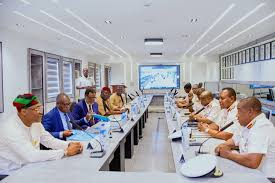Maritime
Retirees Send SOS To Jonathan
Nigerian Ports Authority retirees of 1991 have appealed for President Goodluck Jonathan’s intervention over the non-payment of their terminal benefits.
The retirees lamented that nearly 20 years after they were unlawfully retrenched, the management of the authority has not given them their statutory rights as its former employees.
Speaking to The Tide in Port Harcourt on Wednesday, one of the affected retirees who preferred anonymity said many of their colleagues have lost their lives, children, with wards thrown out of schools and homes as they could no longer meet their basic responsibilities over the years.
In a save our souls’ (SOS) letter addressed to President Jonathan, he said, the 1991 retirees of NPA said their appointments were unlawfully terminated on June 10, 1991 by NPA without compliance with the federal government circular on pensions and gratuity.
According to him, the content of the letter states that the federal government circular supersedes any circular of NPA in the event of any conflict. Noting that the federal government had on September 13, 1991 issued a circular No. B.632 16/S.1/X/618 through the Federal Ministry of Establishment to all federal ministries and all federal parastatals on pension review.
“This circular took effect from January 1,1991. The circular ref No B. 632/6/S.1/x/618 of September 13, 1991 as the amendment of the pension act of 1990 and the federal government official gazette No. 98 volume 69, amendment act 1982, and NPA condition of service. At this time, the circular has duly covered us while in service.
“The circular stipulates that we are entitled to pension and gratuity. That is pension for those of us who served the authority for a period of 10 years and above but less than 15 years, and gratuity for those who served the authority for a period of 5 years and above but less than 10 years.
The retirees expressed dismay that a demand for the payment of their entitlement was not accepted by the management of the authority over the years despite repeated appeals to several quarters.
“We consider it a denial of our entitlement and had no alternative than to go to court because we could not have wasted more time since NPA is a statutory body to avoid time barred. We instituted suit No LD/1827/92 to secure the payment of our entitlement from NPA. The conclusion of the trial by the Hon. Justice A.R.A Shaid of the Lagos High Court was on July 12, 1996 was in favour of the retrenched staff.
“The court had declared that pension and redundancy be paid to those of us who served NPA for years and above but less than 15 years and gratuity for those of us who served for 5 years above but less than 10 years. Let us make it abundantly clear to the general public that NPA management and its board never intended to pay our entitlements, hence, the refusal and denial of same 19 years after disengagement despite court judgement and all ministerial directives for our payment”, they said.
The former employees of the authority said the management of NPA refused to honour the judgement of the high court against the judgement in suit No. CA/L/42597.
“This appeal was on February 16, 1998 dismissed for want of diligent prosecution. The NPA and its board ignored all communication from our lawyer, Mr. Makinde, for modalities to settle the retirees and went ahead to institute a fresh suit NO. LD/1021/99; this time to set aside the judgement of Justice A.R.A Shaid of Lagos High Court.
This new suit was dismissed our lawyer wrote again to NPA notifying it of the dismissed suit NPA went to Appeal Court in suit NO CA/L99/2002 and the appeal was allowed, so we went to Supreme Court in suit No SC/190/2003. The judgement of this suit was on May 11, 2007 in favour of the retrenched staff. This judgement of the Supreme Court affirmed the judgement of the court of Lagos by Hon. Justice Shaid. Yet NPA refuses to pay till date.”
“As a result of this the retrenched staff went to the Senate with an appeal to the Committee on Establishment and Public Services. The Senate directed the managing director to comply based on the Supreme Court judgement. They refused to obey. We went to Minister of Justice and Attorney General of the Federation, Alhaji Mohammed Adoke’s office with an appeal.
“The minister wrote to the Managing Director of NPA advising NPA to comply immediately with the judgement. Yet it refused to obey. We do not know who is standing against our payment or where NPA gets its strength for what it is doing,” the aggrieved former employees added in their letter to Jonathan.
Maritime
NCC Announces Telecoms Facilities Protection Measures

Maritime
Bureaucracy, Relationship Gaps, Bane Of Maritime Safety Investigation – NSIB

Maritime
UNDP, REA Partner On Clean Energy Transition

-
Featured3 days ago
Rivers LG Poll: APC Wins 20 chairmanship seats, PDP Clears Three
-
News3 days ago
Stop politicising Niger Delta’s plight over personal interest, Ex-militant warns Ijaw youths
-

 Nation3 days ago
Nation3 days agoAccolades, Fanfare As Ogbakor Ikwerre President General Celebrates 80th Birthday
-
News3 days ago
Keep faith with Tinubu’s Renewed Hope Agenda – NOA begs Nigerians
-
News3 days ago
Cleric Condemns Increasing Theft in God’s House
-

 Niger Delta4 days ago
Niger Delta4 days agoBayelsa Tasks Security Agencies On Vigilance Over Waring Communities
-
News3 days ago
Okpebholo, Edo Speaker mourns ex-IGP, Arase
-
News3 days ago
Ojulari: CNPP, civil society groups demand judicial probe into NNPCL

